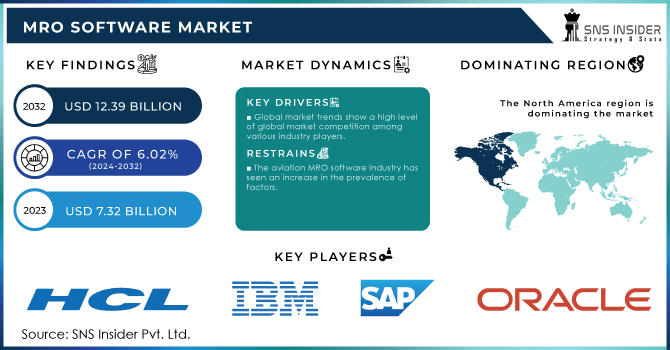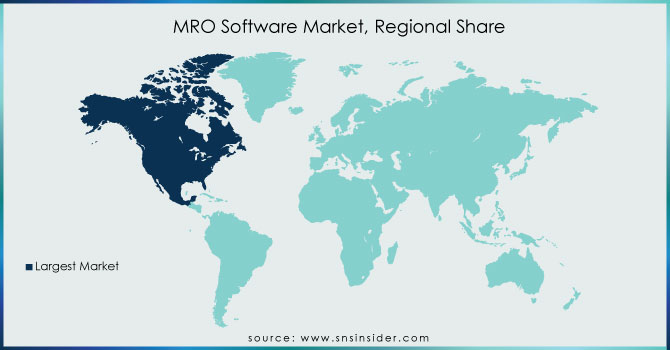MRO Software Market Report Scope & Overview:

To get more information on MRO Software Market - Request Free Sample Report
The MRO Software Market Size was valued at USD 7.32 billion in 2023, expected to reach USD 12.39 billion by 2032 with a growing CAGR of 6.02% over the forecast period 2024-2032.
Some of the major factors driving market growth are increased demand for aviation maintenance software and services from MRO companies, as well as increased demand for predictive, prescriptive, and condition-based maintenance via data shared by connected aircraft. Increased investments in the development of new and advanced software, as well as the adoption of software as a service, drive the market's productive growth. Furthermore, MRO increasing adoption of AI, Big Data, and IoT drives market growth. However, stringent government regulations, rising concerns about cyber security or data security, and the high cost of data collection are some of the factors limiting growth in the coming years.
MARKET DYNAMICS
KEY DRIVERS
-
Stringent aviation regulations
-
Global market trends show a high level of global market competition among various industry players.
RESTRAINTS
-
The high cost of installing market software, combined with a lack of knowledge, is likely to stymie the growing ability.
-
The aviation MRO software industry has seen an increase in the prevalence of factors.
OPPORTUNITIES
-
Enhancing innovation and implementation of the aviation MRO software
-
The aviation MRO software industry is seeing an increase in military interest in using software in war games to help train soldiers.
THE IMPACT OF COVID-19
As the epidemic has hit the lives of people and businesses, we have introduced the struggles and ongoing challenges for market players to overcome. Restricted work closures followed by trade rules create problems such as import and export restrictions, and restrictions on domestic and international travel are market practices that the market takes time to deal with and resolve. Global market governments around the world are also setting various barriers that lead to a shortage of skilled workers and workers who are likely to disrupt and affect market power during the 2020 epidemic and its aftermath. Appearing as a competitor, sending an epidemic, and compensating for losses incurred during this period, MRO aviation software market players increased their focus on research and development to come up with strategies that provide performance improvement and market growth.
The MRO Software Market is likely to see a significant increase in investment value in various industries such as defense and aerospace. Furthermore, there has been a significant demand for MRO aviation software services in the health, medical, and pharmaceutical areas, which are likely to research and produce effective vaccinations as well as execute campaigns to treat corona virus infections during forecasting.
The market is divided into five functions: maintenance management, operations management, business management, electronic flight bag management, and logbook management. During the forecast period, the maintenance management segment is expected to have the largest market share. Base maintenance, engine maintenance, fleet management, and line maintenance are all subcategories. During the forecast period, demand for basic maintenance MRO software modules is expected to rise due to increased demand from operators and MROs for efficient management of heavy maintenance checks.
The MRO Software market is divided into operators, OEMs, MROs, and Airlines based on end-user. Because of the growing digitization trend in the aviation MRO industry, the MROs segment is expected to grow at a high CAGR. Aviation MRO software tools are used by the MRO industry to improve functional efficiency in various aviation MRO activities such as service, maintenance, upgrade, and retrofitting of various aircraft engines, spare parts, components, and systems.
The Aviation MRO Software Market is experiencing significant expenditure and spending in sectors such as aerospace and defence. This is assisting the market globally in securing opportunities that aid in the enhancement of innovation and implementation of aviation MRO software. The aviation MRO software industry is witnessing a surge in military interest in using software in war games to train soldiers, which necessitates the use of these technologies. Key market players such as Entrust Solutions are developing innovative aviation MRO software, technologies, and services such as artificial intelligence and machine learning to help improve the efficiency presented to market end-users.
KEY MARKET SEGMENTATION
By Function
-
Maintenance
-
Operations
-
Business Management
By Solution
-
Enterprise Resource Planning Solution
-
Point Solution
By Deployment
-
On-Premise
-
Cloud
by Application
-
Commercial
-
Military
By End-User
-
Airlines
-
MRO Companies
-
OEMs
REGIONAL ANALYSIS
The global market for MRO Software is divided into North America, Europe, Asia Pacific, Central and South America, and the Middle East and Africa. The North American region is expected to hold the largest market share at the time of forecasting due to the largest aircraft fleet in the US, and the growing need for analysis in developing the service industry, among other factors driving market growth. In addition, the increase in government funding for research and development activities also encourages market growth. In addition, Asia Pacific is expected to grow at a higher CAGR during the forecast period. The growing development and development of state-of-the-art drone software in China drives significant market growth. The growth of aircraft fleet and the presence of major aircraft repair and maintenance facilities in countries such as China and Singapore adopting MRO software drive market growth.

Need any customization research on MRO Software Market - Enquiry Now
REGIONAL COVERAGE:
-
North America
-
USA
-
Canada
-
Mexico
-
-
Europe
-
Germany
-
UK
-
France
-
Italy
-
Spain
-
The Netherlands
-
Rest of Europe
-
-
Asia-Pacific
-
Japan
-
south Korea
-
China
-
India
-
Australia
-
Rest of Asia-Pacific
-
-
The Middle East & Africa
-
Israel
-
UAE
-
South Africa
-
Rest of Middle East & Africa
-
-
Latin America
-
Brazil
-
Argentina
-
Rest of Latin America
-
KEY PLAYERS
The Major Players are HCL Technologies Limited, SAP SE, International Business Machines Corporation, Ramco Systems Limited, IFS AB, Oracle Corporation, Boeing, Infor, Trax, Swiss Aviation Software and Other Players
| Report Attributes | Details |
|---|---|
| Market Size in 2023 | US$ 7.32 Billion |
| Market Size by 2032 | US$ 12.39 Billion |
| CAGR | CAGR of 6.02% From 2024 to 2032 |
| Base Year | 2023 |
| Forecast Period | 2024-2032 |
| Historical Data | 2021-2022 |
| Report Scope & Coverage | Market Size, Segments Analysis, Competitive Landscape, Regional Analysis, DROC & SWOT Analysis, Forecast Outlook |
| Key Segments | • By Function (Maintenance, Operations, Business Management) • By Solution (Enterprise Resource Planning Solution, Point Solution) • By Deployment (On-Premise, Cloud) • By Application (Commercial, Military) • By End-User (Airlines, MRO Companies, OEMs) |
| Regional Analysis/Coverage | North America (USA, Canada, Mexico), Europe (Germany, UK, France, Italy, Spain, Netherlands, Rest of Europe), Asia-Pacific (Japan, South Korea, China, India, Australia, Rest of Asia-Pacific), The Middle East & Africa (Israel, UAE, South Africa, Rest of Middle East & Africa), Latin America (Brazil, Argentina, Rest of Latin America) |
| Company Profiles | HCL Technologies Limited, SAP SE, International Business Machines Corporation, Ramco Systems Limited, IFS AB, Oracle Corporation, Boeing, Infor, Trax, Swiss Aviation Software. |
| DRIVERS | • Stringent aviation regulations • Global market trends show a high level of global market competition among various industry players. |
| RESTRAINTS | • The high cost of installing market software, combined with a lack of knowledge, is likely to stymie the growing ability. • The aviation MRO software industry has seen an increase in the prevalence of factors. |

